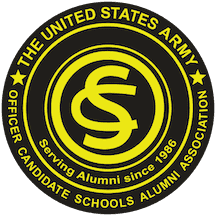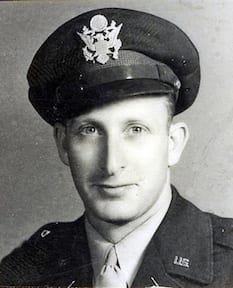Lieutenant Donald B. Prell
Description
Donald B. Prell was born in Los Angeles, California, and graduated from Los Angeles High School in the summer of 1942. In his freshman year at UCLA, he enlisted in the U.S. Army. In 1944, aged 19, he graduated from Officer Candidate School, Fort Benning, Georgia, and was commissioned a Second Lieutenant, Infantry.
Serving in the European Theater of Operations in command of the second platoon of the Anti-Tank Company, 422nd Regiment, 106th Division, during the Battle of the Bulge, 16-19 December 1944, Prell was wounded and captured. On 17 March 1945, he was briefly freed by Task Force Baum, a clandestine U.S. Army mission to liberate Oflag XIII-B authorized by General George S. Patton, Jr. The raid was a fiasco, with many POW casualties, including Patton's son-in-law, LTC John K. Waters, who was seriously wounded. (Patton reported the raid as the only mistake he made during World War II and General Dwight Eisenhower reprimanded him for it.)
Prell’s freedom lasted only a few days as he was recaptured after attempting to locate friendly forces. A month later, he escaped from a POW camp south of Nuremberg and found his way to freedom.
Prell's military awards include the Combat Infantryman Badge, Bronze Star w/OLC, Purple Heart, POW Medal w/ service star for second award, American Campaign Medal, European-African-Middle Eastern Campaign Medal, World War II Victory Medal, and Armed Forces Reserve Medal. | After the war, he resumed undergraduate studies at UCLA and graduated in 1948. While at UCLA, Prell was an active member of the American Veterans Committee, which was committed to integrating the U.S. military. He was also involved with successfully ending racial discrimination of patrons at Oakley's Barbershop in Westwood. From 1948-1951, Prell was a Ph.D. candidate in Psychology with Hans Eysenck’s Program Research Team at the University of London. It was here that he learned to use Hollerith punched card tabulation machines, the forerunner of today’s digital computers.
Whilst studying for his graduate degree at the University of London, Prell was employed as a Psychologist at the West Park Hospital, Epsom, Surrey. During the 1950s, he worked with Rand Corporation futurist Herman Kahn, who later founded the Hudson Institute in New York. In this period, Prell was associated with many of the early designers of high-speed computer input-output devices, analog to digital converters, and digital display plotters, including working with Bernard Benson of the Benson-Lehner Corporation. In 1957, working with Thomson Publications, he created Datamation, the first magazine dedicated solely to the emerging computer-data-processing industry.
In 1961, he was president, and the major shareholder, of Electro-Radiation, Inc, a Santa Monica, California firm specializing in molecular electronics and electroluminescence. Later, he founded and served as President of two venture capital firms: in 1967, Union Ventures (a subsidiary of the Union Bank N.A.) and, in 1980, Imperial Ventures (a subsidiary of Imperial Bank of California). During his association with Union Bank, whose CEO at the time was banking innovator Harry Volk, Prell was responsible for producing the bank’s first and only 30-year Strategic Plan.
In the 1980s, Prell founded, and was the first chairman of, the UCLA College of Letters and Science Dean’s Council. Prell also served as a longtime member of the Chancellor’s Associates during the tenure of Chancellor Charles E. Young, along with such friends and colleagues as Rafer Johnson, Larry Irell and J.D. Morgan. He was a trustee of the UCLA Foundation and was also a president of the Order of the Blue Shield, an alumni group dedicated to furthering the interest and welfare of UCLA. The UCLA College of Letters and Science annually awards three scholarships on the basis of academic merit to UCLA undergraduate students in the name of Donald Prell and his wife, Bette Prell.
Prell received the UCLA University Service Award in 1977. | Over the course of his career, Prell pursued long-standing interests in both Edward John Trelawny, a novelist and friend of Percy Bysshe Shelley and Lord Byron, and Pierre Laval, Prime Minister of France in the 1930s and again during the Vichy era. In the course of Prell's research, he authored four journal articles and six books and developed extensive collections of material by and about Trelawny and Laval. These research materials have been donated to two Southern California libraries.
In 1960, Prell married Elizabeth (Bette) Howe, novelist and assistant editor of Datamation. They had two children: Owen Prell and Erin Semper (née Prell). He and his wife lived in Palm Springs, California, from 1996. Prell appeared in a 2010 documentary about the life of Nico Minardos, a Greek-American actor, titled Finding Nico, which was produced and directed by Owen Prell. Donald Prell had been a longtime friend of Minardos from their bachelor days in Los Angeles in the 1950s and he and his wife, Bette, had named Minardos as a godfather to their children.
Prell died on 28 July 2020 at the age of 96.

